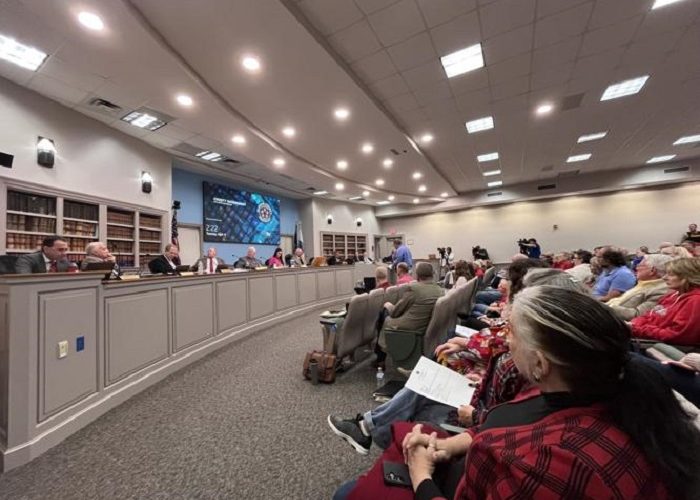LA GRANGE, Ky. – In a heated fiscal court meeting on Tuesday, Oldham County leaders voted unanimously to begin the process of imposing a 150-day moratorium on new data center developments. The decision comes as the county grapples with growing concerns from residents over the impact of large-scale tech facilities in the rural community. However, one high-profile proposal, known as “Project Lincoln,” will continue to move forward, despite widespread opposition.
The fiscal court’s vote to consider a moratorium on data center applications was seen as a step to slow down the rapid expansion of such projects in the region. The 150-day freeze would halt new applications and related work, giving local officials time to update planning standards to better accommodate—or regulate—these fast-growing tech developments.
But Judge-Executive David Voegele made it clear that the controversial Project Lincoln, a massive data center planned for a 267-acre site on Ky. 53 north of La Grange, is not affected by the moratorium. An application for a land-use change to accommodate the project had already been filed, meaning it must continue through the approval process. “We don’t have the unilateral right to say, ‘Take your application and walk,’” Voegele stated. “We have to go through the process of dealing with it. That’s their legal right to do that.”
Despite his reservations about the project, which is planned by New York-based Western Hospitality Partners – Kentucky LLC (WHP), Voegele noted that the county board of adjustments may not approve the necessary permit, as the land is currently zoned for agricultural and conservation use. To bypass zoning requirements, the developers are seeking a conditional use permit (CUP) under a category called “Private Utility Building and Facilities.”
The data center would feature eight buildings filled with high-tech equipment designed to process vast amounts of digital information. The proposal, which has been the subject of intense public scrutiny since it was announced, has sparked significant opposition among local residents, many of whom worry about the environmental, noise, and infrastructure impacts of such a large-scale project in a rural area.
During the public comment portion of Tuesday’s meeting, nearly 30 residents voiced their concerns. Most expressed outright opposition to Project Lincoln, citing its potential negative effects on property values, quality of life, and the county’s rural character. Barry Laws, a local resident, captured the sentiment of many when he said, “This whole project smells like Oldham County is for sale,” referring to the potential economic motivations behind the development. He continued, “This project is not quiet, and it’s not amazing.”
Nathan Oberg, a nearby resident and organizer of the “We are Oldham County” Facebook group, also spoke against the project. He urged the fiscal court to implement the moratorium, stating, “We need safeguards in place to protect our citizens, our rights, and our property values. This is what we’re fighting for.”
Opponents of the data center have raised additional concerns over the process by which the proposal is moving forward. The developers have hired Jim Urban, the county’s former planning director, as a consultant, prompting accusations of exploiting legal loopholes to bypass zoning restrictions. Anita Travis Richter, another local resident, called on Oldham County officials to be transparent and to consider the input of residents who have become well-versed in the complexities of data center developments. “Let’s not try to have a consultant that knows where the loopholes are to get it through,” she said.
While the debate over Project Lincoln continues, the fiscal court’s vote to consider a moratorium on new data center projects sets the stage for broader discussions about how to balance economic growth with community concerns. The county planning commission will begin its review of the moratorium in the coming weeks, and the final ordinance would require approval by the fiscal court.
The rapid growth of the data center industry, particularly in Kentucky and surrounding states, has created both economic opportunities and challenges for local governments. Companies like Meta (formerly Facebook) have made significant investments in large-scale data centers in neighboring areas, including a proposed $800 million facility in Jeffersonville, Ind. However, as these developments increase in number and scale, local communities like Oldham County are grappling with how to manage their impact on the environment, infrastructure, and quality of life.
As the county moves forward with the moratorium process, all eyes will be on the outcome of the Project Lincoln proposal and how it might influence future decisions regarding the rapidly expanding data center industry in the region.











